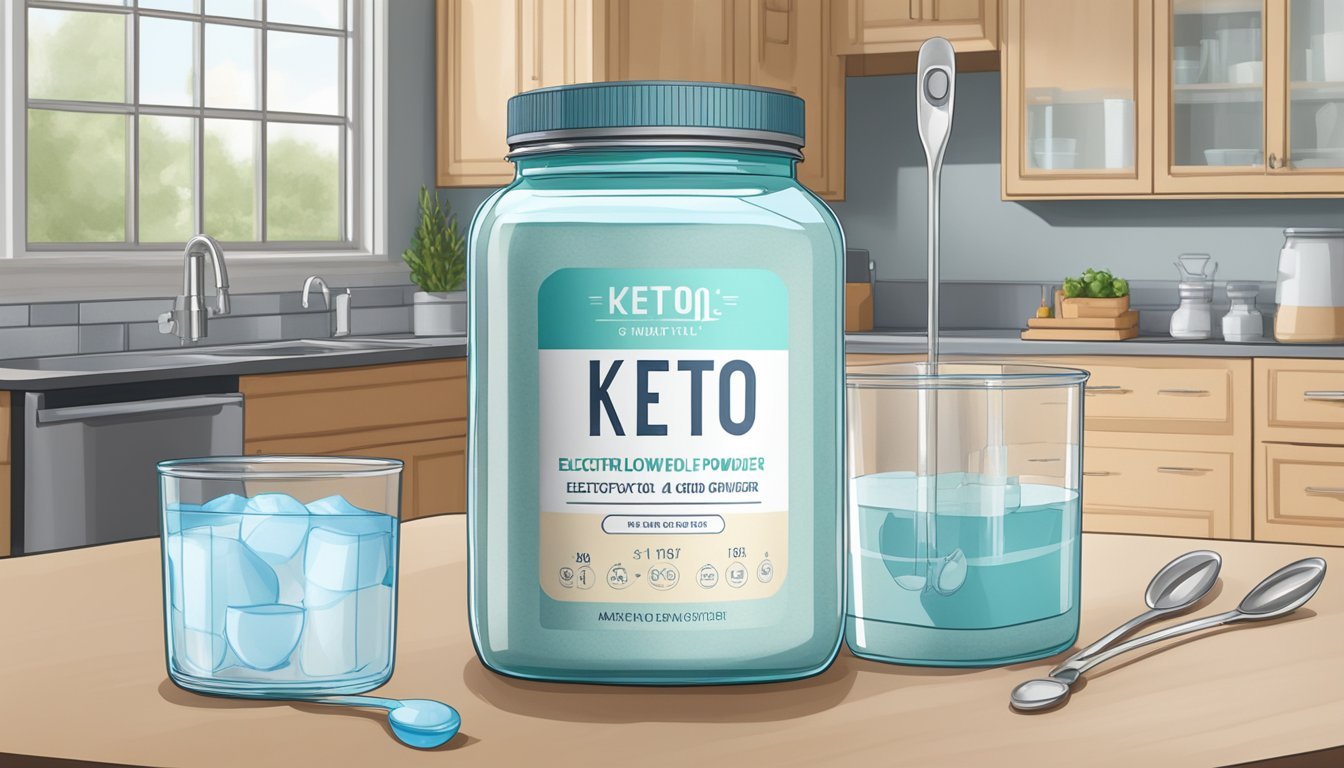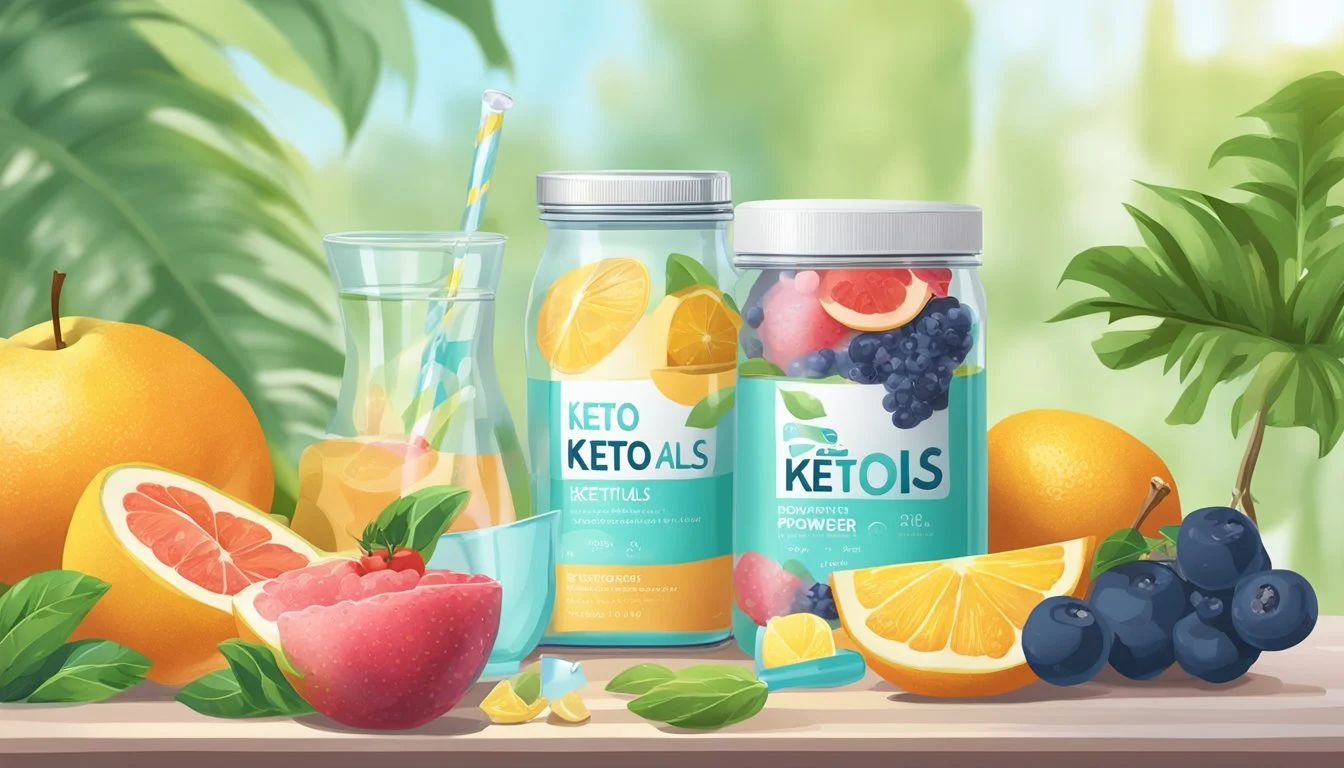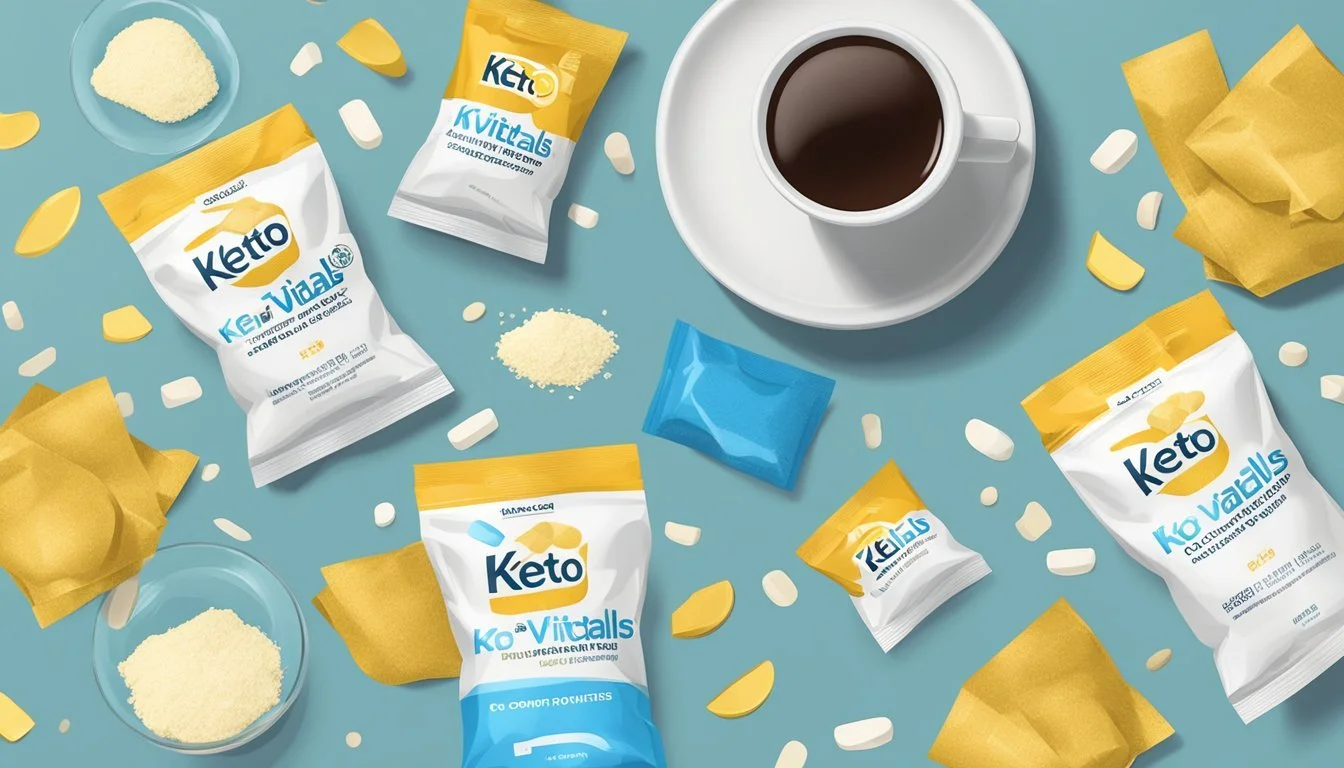How Many Servings of Keto Vitals Electrolyte Powder is Too Much
Expert Guidance
Following a ketogenic diet can often result in an increased need for electrolytes, making supplementation essential. Keto Vitals Electrolyte Powder offers a convenient solution to meet these needs, but the question arises: how much is too much?
Exceeding four servings of Keto Vitals Electrolyte Powder daily may lead to an imbalance of vital minerals such as sodium, potassium, and magnesium. This imbalance could cause adverse effects like nausea, diarrhea, or even more severe complications. Thus, it's critical to monitor your intake and adjust based on your specific dietary needs and activity levels.
Balancing electrolytes while maintaining a ketogenic diet requires an informed approach. Consult a healthcare professional to determine the appropriate dosage for your individual needs, ensuring optimal health without the risks associated with overconsumption.
Understanding Electrolytes on a Ketogenic Diet
Maintaining proper electrolyte levels is essential for anyone following a ketogenic diet. Electrolytes like sodium, potassium, and magnesium play key roles in hydration, nerve function, and muscle performance.
Role of Electrolytes in Ketosis
When someone adopts a ketogenic diet, they enter a state called ketosis, where the body burns fat instead of carbohydrates for fuel. During ketosis, insulin levels drop, causing the kidneys to excrete more water and important minerals.
This increased excretion leads to a greater need for electrolytes to maintain overall health. Without sufficient electrolytes, individuals may experience symptoms like fatigue, muscle cramps, and dizziness.
Common Electrolytes and Their Importance
Sodium: Critical for retaining water and ensuring proper cell function. On a keto diet, daily intake should range between 3,000 and 5,000 mg.
Potassium: Vital for heart health and muscle function. Keto dieters should aim for 2,600 to 3,400 mg per day to prevent deficiencies.
Magnesium: Essential for muscle relaxation and prevention of cramps. The recommended intake is 320 to 420 mg daily.
Lack of these electrolytes can lead to significant health concerns, particularly in those new to the ketogenic diet.
Electrolyte Imbalance and Keto Flu
A common issue for ketogenic dieters is the "keto flu," a collection of symptoms that occur as the body adapts to ketosis. These symptoms include headaches, nausea, and irritability.
They often result from an electrolyte imbalance caused by increased mineral excretion and lower intake.
To combat these symptoms, it is crucial to replenish these minerals through either diet or supplementation.
Hydration also plays a critical role. Drinking enough water helps maintain proper electrolyte balance, reducing the likelihood of experiencing keto flu symptoms.
Significance of Keto Vitals Electrolyte Powder
Keto Vitals Electrolyte Powder is essential for maintaining electrolyte balance while on a ketogenic diet. It supports various functions such as hydration, blood pressure regulation, muscle contraction, and bone health.
Key Benefits of Supplementing with Electrolytes
Electrolytes are crucial for those on a ketogenic diet since they help offset the loss of minerals due to reduced carbohydrate intake. This supplement contains potassium, magnesium, sodium, and calcium. These components help maintain hydration and prevent the “keto flu,” a common issue when transitioning to ketosis.
Potassium aids in muscle contraction and nerve function. Magnesium supports muscle relaxation and bone health. Sodium helps regulate blood pressure and maintain fluid balance. Calcium is vital for bone strength and muscle function.
Optimizing Electrolyte Intake for Ketosis
Achieving and maintaining ketosis requires careful management of nutrient intake, and electrolytes play a pivotal role. The recommended serving varies, but typically one serving per day is sufficient for most individuals. However, factors such as physical activity, climate, and individual metabolic needs can affect this.
It's crucial to balance electrolyte intake to avoid issues like muscle cramps or high blood pressure. Users must monitor their symptoms and adjust the dosage accordingly. Proper intake ensures effective hydration, improved muscle function, and overall metabolic health while on a ketogenic diet.
Daily Electrolyte Requirements and Safe Supplementation
When following a ketogenic diet, maintaining proper electrolyte balance is crucial. Specifically, focus on adequate intake levels and recognizing potential overconsumption symptoms for optimal health.
Recommended Electrolyte Intake for Keto Dieters
A ketogenic diet often necessitates increased sodium, potassium, and magnesium intake. Sodium is pivotal, with recommendations ranging from 3,000 to 5,000 mg daily. Reduced carbohydrate intake leads to less water and sodium retention, underscoring sodium's importance.
Potassium intake should be between 2,600 to 3,400 mg per day. This electrolyte helps in muscle function and heart health. Magnesium requirements range from 320 to 420 mg daily, vital for muscle and nerve function. Calcium and chloride are also essential, though less frequently discussed.
Make sure to balance intake through diet or supplements, and consider consulting with a healthcare professional to tailor these recommendations to individual needs, especially if combining with other health conditions.
Identifying the Signs of Too Much Intake
Overconsumption of electrolytes can lead to multiple health issues. Excess sodium can cause high blood pressure, leading to cardiovascular risks, as indicated by the American Heart Association. Symptoms include swollen feet or hands, and increased thirst.
Too much potassium might cause hyperkalemia, leading to heart irregularities and muscle weakness. Similarly, excessive magnesium can result in diarrhea, nausea, and abdominal cramping.
Monitoring calcium and chloride is less common but equally important. High levels might cause gastrointestinal distress and affect heart rhythm. If you notice these symptoms, it might be a sign to reduce supplementation and seek medical advice immediately.
Using the appropriate dose of Keto Vitals Electrolyte Powder ensures you stay within the safe limits of each electrolyte, aiding in maintaining overall health on a ketogenic diet.
Potential Risks and Side Effects
Consuming too much Keto Vitals Electrolyte Powder can lead to adverse health effects. It is essential to be aware of the potential consequences of excessive electrolyte intake and its interactions with medications or existing health conditions.
The Impact of Excessive Electrolyte Consumption
Overconsumption of electrolytes such as sodium, potassium, and magnesium can cause a range of health issues. High sodium intake may lead to high blood pressure, increasing the risk of cardiovascular problems. Excessive potassium can result in hyperkalemia, which can affect heart function and lead to muscle weakness or even paralysis.
Magnesium overload might cause gastrointestinal problems like diarrhea and abdominal cramping. Chronic high intake of these electrolytes can disrupt the body's fluid balance, leading to dehydration or edema. Monitoring electrolyte levels and adhering to recommended dosages is crucial to avoid these risks.
Interactions with Medications and Health Conditions
Individuals on medications or with specific health conditions need to be particularly cautious. For example, people taking diuretics or blood pressure medications may experience altered electrolyte balances. This can exacerbate the side effects of their medications or worsen their health conditions.
Patients with kidney disease should be especially vigilant, as their kidneys may struggle to regulate excess electrolytes. Hyperkalemia is a significant risk for these individuals. Consulting healthcare providers before starting any supplement, including Keto Vitals Electrolyte Powder, can help prevent dangerous interactions and ensure safe use tailored to individual health needs.
Natural Electrolyte Sources and Keto-Friendly Alternatives
Maintaining proper electrolyte balance is essential for those on a ketogenic diet. Here are some excellent natural sources and keto-friendly foods to consider.
Food Sources Rich in Electrolytes
Electrolytes such as sodium, potassium, and magnesium are vital for muscle function and hydration. Avocado is a powerhouse, providing a good amount of potassium. Spinach and other leafy greens also offer a generous dose of magnesium and calcium.
Another excellent choice is nuts, including almonds and cashews, which are rich in magnesium. Fish like salmon and mackerel provide both potassium and sodium. Mushrooms and broccoli are also noteworthy, supplying magnesium and potassium.
Keto-Friendly Electrolyte-Rich Foods
For those on a keto diet, foods that are both low in carbs and high in electrolytes are crucial. Bone broth is a great keto-friendly option, rich in sodium and potassium. Pumpkin seeds are another excellent choice, packed with magnesium and beneficial fats.
Cheese offers calcium and sodium, contributing to overall electrolyte balance without adding too many carbs. Including leafy greens like kale and spinach, as well as avocado, ensures you receive necessary nutrients while staying within keto guidelines.
Focusing on these foods can help maintain electrolyte levels effectively while adhering to a ketogenic lifestyle.
Personalizing Electrolyte Intake on Keto
Finding the right balance of electrolytes on a keto diet depends on individual needs, which are influenced by various factors like diet, activity levels, and sweat rate. It is essential to adjust electrolyte dosages to support health and optimize fat-burning on a low-carb diet.
Guidelines for Tailoring Electrolyte Dosage
Everyone's electrolyte needs are unique. Sodium, for instance, is critical for maintaining hydration and electrolyte balance. A standard recommendation is around 4,000 mg of sodium per day on a keto diet, but this can vary based on personal factors.
Potassium is vital for muscle and heart function. Recommended intake can range from 2,000 - 4,700 mg daily. Magnesium is also important, and intake should be tailored to avoid deficiencies that can cause cramps and insomnia.
Using products like electrolyte powders can help meet these needs, but it's essential to monitor the body's response. Signs like headaches, muscle cramps, and fatigue often indicate the need for adjustments.
Adjustments Based on Lifestyle Factors
Physical activity significantly impacts electrolyte requirements. Those who engage in regular exercise or have high sweat rates may need increased sodium and potassium intake to replace losses.
For individuals with higher insulin sensitivity, balancing blood sugar levels is crucial. Insufficient electrolytes may hinder effective glucose metabolism.
Moreover, a salt intake that varies depending on sweat production and activity levels can help maintain electrolyte balance without overconsumption, which can lead to bloating.
Lastly, consider whether the electrolyte supplements are sugar-free to avoid unnecessary carb intake, which is crucial for those on a strict keto diet.
Conclusion
When using Keto Vitals electrolyte powder, mindful consumption is key. It’s important to measure the exact serving according to individual requirements, keeping in mind that each person's needs vary significantly.
A balanced keto diet not only depends on macronutrient ratios but also the intake of essential electrolytes. Tracking sodium, potassium, and magnesium is crucial for health and wellness.
The general guideline for electrolyte intake on a keto diet includes 3-5 grams of sodium, 2.6-3.4 grams of potassium, and 320-420 mg of magnesium daily. Please note that exceeding these amounts can lead to imbalances and adverse effects.
Always consult with a healthcare professional before making significant changes to your diet, particularly when it involves supplements. This ensures that your electrolyte intake is both safe and effective.









